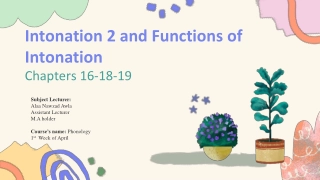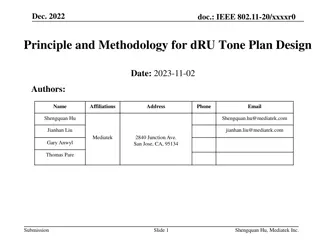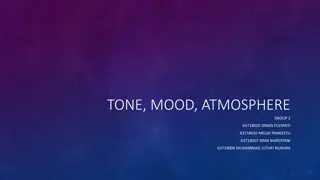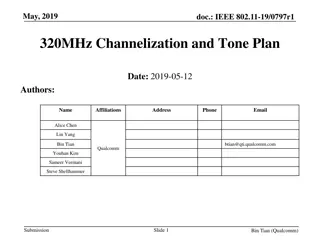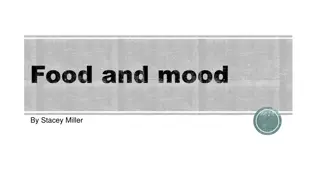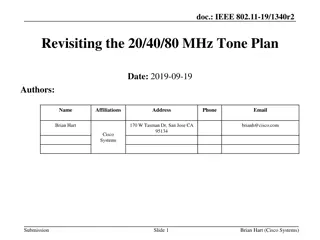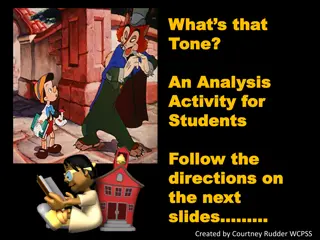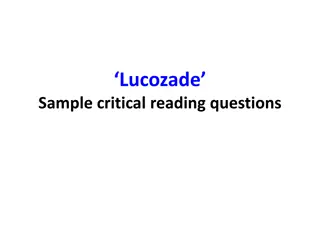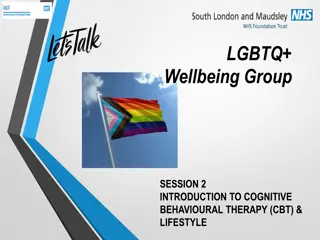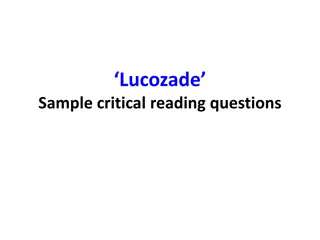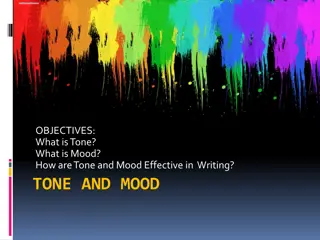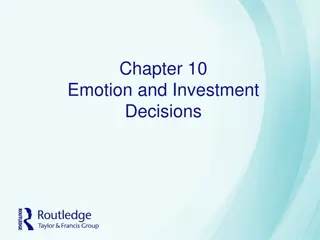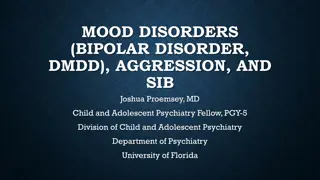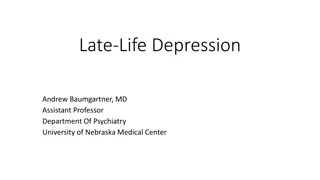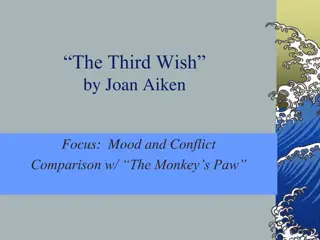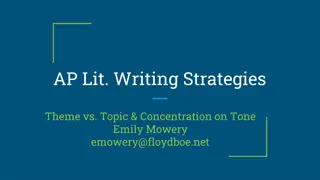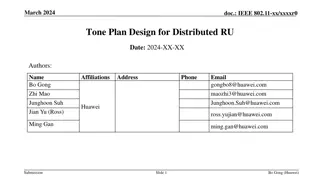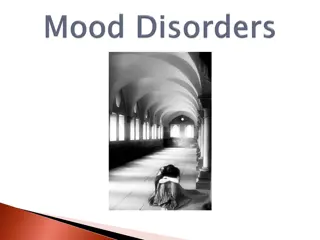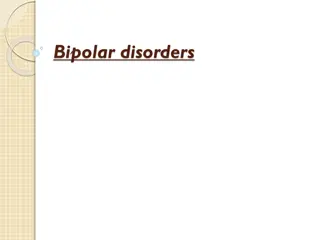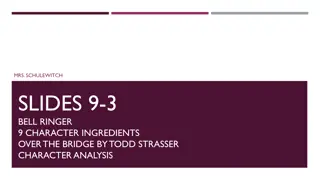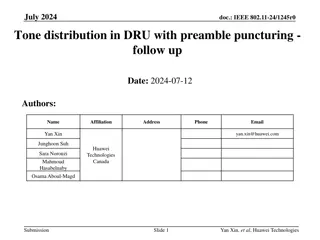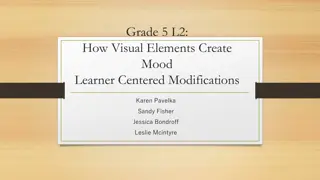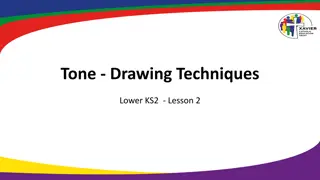Understanding Intonation and Tone in Phonetics
Intonation and tone play crucial roles in conveying meaning and expression in spoken language. Intonation refers to the melodic pattern of speech that can indicate various emotions or grammatical functions, while tone represents the pitch, quality, and strength of vocal sounds within words. By maste
4 views • 27 slides
Principle and Methodology for dRU Tone Plan Design in IEEE 802.11-20
Introduction of Distributed Tone RU (dRU) as a potential UHR PHY feature to address PSD limitations for 6GHz LPI and enhance Rate vs. Range performance. Emphasis on dRU tone plan design criteria, methodologies, and performance simulations. Detailed examination of design principles, methods, consider
4 views • 23 slides
Feeling Down Dr. Arnab Can Help with Mood Issues @9804509480. Arnab Can Help with Mood Issues @9804509480
Struggling with Your Mood? Get the Support You Deserve (See Dr. Arnab). Restore Your Wellbeing: Dr. Arnab Specializes in Mood Disorders. Experience emotional ups and downs, anxiety, or low moods? Dr. Arnab can help. He offers a supportive and confidential environment to understand your mood symptoms
1 views • 2 slides
Understanding Mood and Modality in Morphosyntax with Prof. John Corbett
Today's session with Prof. John Corbett explores the final three sets of grammatical categories related to verbs: mood (fact or non-fact), modality (speaker's stance), and voice (subject's role). The session delves into the present-day English mood system, differentiating between various realization
1 views • 24 slides
Understanding Tone, Mood, and Atmosphere in Literature
Atmosphere, mood, and tone are essential elements in literature that shape the emotional tone of a literary work, influence reader expectations, and convey the author's attitude. They are interconnected yet distinct aspects that add depth and complexity to storytelling. This analysis delves into the
0 views • 12 slides
Channelization and Tone Plan Discussion for 320MHz EHT
IEEE 802.11-19/0797r1 discusses the channelization and tone plan design for 320MHz in EHT (11be). The slides cover the benefits of a 320MHz channel, double peak throughput, various BW modes, existing and new configurations, and proposals for tone plans to maximize efficiency. Detailed considerations
0 views • 10 slides
Understanding Food and Mood: Importance of Eating Regularly
Explore the connection between food choices and mood in this insightful content by Stacey Miller. Learn why skipping meals is not recommended, the impact of energy drinks on anxiety, and the effects of sugary cereals on your day. Discover tips to manage food cravings and improve sugar sensitivity th
1 views • 20 slides
Revisiting the IEEE 802.11-19/1340r2 Tone Plan Optimization
Revisiting the tone plan optimization for IEEE 802.11-19/1340r2, addressing issues with RUs near band edges, accommodating various STA bandwidth capabilities, and the inefficiencies of non-SST 11ax STAs in different BSS scenarios. Proposals include adapting to unknown future 11ax features, minimizin
5 views • 12 slides
Understanding Tone and Mood in Text Analysis Activities
This activity guide created by Courtney Rudder of WCPSS provides students with text excerpts to analyze for tone and mood. Students work in pairs to discuss the text and use a list of tone and mood words provided to help them. The guide progressively offers more challenging texts for analysis, encou
1 views • 9 slides
Critical Reading Analysis: Language and Mood in "Lucozade
The critical reading questions delve into how the language and imagery in the poem "Lucozade" create a solemn mood, depict the speaker's mother's illness, convey the mother's feelings about being in the hospital, and highlight a significant shift in the mother's mood. Through thoughtful analysis of
0 views • 13 slides
Understanding Stress, Anxiety, and Low Mood: A CBT Approach
Explore how Cognitive Behavioural Therapy (CBT) can help manage stress, anxiety, and low mood in the LGBTQ+ community. Learn about the 5 areas model, lifestyle factors, and coping strategies to improve mental well-being. Gain insights on identifying and addressing thoughts, situations, body response
0 views • 38 slides
Comprehensive Guide to Imaginative Writing: Unit 1 - Mood, Sentence Structures, and Techniques
This comprehensive guide explores various aspects of imaginative writing, including defining mood in literary texts, understanding sentence structures, and learning techniques such as adjectives, similes, metaphors, and more. The unit covers big questions, tasks, and lessons to help students enhance
1 views • 35 slides
Critical Reading of "Lucozade" Poem: Language Analysis and Mood Exploration
The critical reading questions delve into how the language in different stanzas of the "Lucozade" poem creates various moods and conveys the speaker's emotions. The analysis covers the use of imagery, symbolism, and tone to depict solemnity, illness, hospital experiences, and the changing mood of th
3 views • 13 slides
Understanding the Spanish Subjunctive Mood: An Introduction
Explore the intricacies of the subjunctive mood in Spanish, distinguishing it from the indicative and imperative moods. Learn the general rules for differentiating between the indicative and subjunctive, and grasp the concept of mood versus tense. Through examples like Victoria studying Spanish and
0 views • 13 slides
Understanding Tone and Mood in Writing
Explore the concepts of tone and mood in writing, how they are defined, and their impact on creating an atmosphere and eliciting emotions in the reader. Discover how tone reflects the author's attitude and the multiple tones that can exist in a piece of writing. Dive into the general atmosphere crea
0 views • 34 slides
Influence of Emotions on Investment Decisions
Emotions play a significant role in investment decisions, affecting risk preferences and perceptions. Positive emotions lead to riskier choices, while negative emotions result in more risk-averse decisions. Emotions also impact beliefs, preferences, and financial evaluations, potentially causing bia
0 views • 24 slides
Tone and Mood in Various Literary Texts
This content discusses the role of inmates taking on the position of prisoner guards, Elie's experiences in a camp, changes within Elie, incidents with children among guards, and behavioral changes mirrored by Franek due to brutality normalization. It also analyzes the tone and mood in different lit
0 views • 13 slides
Understanding the Hemiplegic Arm and Hand After Stroke
A stroke can cause weakness in the arm and hand, affecting movement and daily tasks. Careful handling reduces pain and complications. Common issues include pain, swelling, altered sensation, and muscle tone changes. Limbs may have low tone (limp) or high tone (stiff), leading to challenges in moveme
0 views • 11 slides
Understanding Tone in Literature: An Analysis of Hamlet
Explore the concept of tone in literature through examples from Shakespeare's "Hamlet." Learn how tone influences the reader's emotional response and enhances understanding of a piece of writing. The analysis delves into Act One, Scene One to reveal the tension and tone Shakespeare sets up in the pl
0 views • 10 slides
Exploring Digital Mood Rings with TI-Nspire and TI-Innovator: A Fun STEM Project
Bring science and coding together with the Digital Mood Ring project using TI-Nspire and TI-Innovator Hub. Dive into color mixing, body temperature thresholds, and essential programming concepts such as variables, loops, conditional statements, and Boolean operators. Follow recommended paths, tackle
0 views • 11 slides
Analyzing Mood and Perception in Literary Works
Analyzing the establishment of mood and changes in perception in different literary works. The author uses details from the passages to explain the mood set through descriptions, perception changes, and the use of sound. Explore how characters' feelings evolve over time.
0 views • 9 slides
Understanding Verbal Irony and Tone Through Examples
Verbal irony is the expression of words conveying the opposite of their literal meaning. It is not the same as lying and is used to emphasize a point. Tone plays a crucial role in conveying irony, as it can affect how the message is perceived. Sarcasm, though related, has a negative agenda of mockin
0 views • 7 slides
Understanding Bipolar Disorder in Children and Adolescents
Bipolar disorder in young individuals is characterized by mood swings between manic and depressive states, with various subtypes such as Bipolar I, Bipolar II, and Cyclothymia. Clinical characteristics include hypomania and mania, which present with distinct symptoms such as elevated mood, increased
0 views • 35 slides
Strategies to Improve Low Mood and Reduce Anxiety
Addressing feelings of low mood and anxiety, this program provides practical steps and strategies for improving mental well-being. It includes insights on changing assumptions, problem-solving, seeking support, and considering medication options. The content emphasizes the importance of cognitive th
0 views • 38 slides
Understanding the Connection Between Emotions and Health in Class 12
Explore the link between emotions and health in Class 12, covering topics from emotions and reasoning to folk wisdom about moods and health. Discover insights into how mood influences immunocompetence and the correlations between mood and various health conditions. Dive into research on the impact o
0 views • 28 slides
Understanding Late-Life Depression: Causes, Prevalence, and Diagnosis
Late-life depression is a prevalent condition among older adults, with factors such as personal history, medical comorbidities, and lack of social support contributing to its onset. This article discusses mood disorders, prevalence rates, risk factors, and differential diagnosis for depressed mood i
0 views • 13 slides
Exploring Mood and Conflict in "The Third Wish" and "The Monkey's Paw
Delve into the comparison of mood and conflict in the short stories "The Third Wish" by Joan Aiken and "The Monkey's Paw." Explore how mood influences the major conflict in a narrative and engages readers. Engage in activities centered around wishing customs and background on swans to deepen your un
0 views • 20 slides
Unveiling Writing Strategies: Theme vs. Topic Focus and Emphasis on Tone by Emily Mowery
Dive into the nuances of topic vs. theme in literature with a focus on analyzing tone. Explore writing activities, examples from "Poisonwood Bible," tone word banks, and engaging tone activities to enhance students' comprehension and creative expression.
0 views • 11 slides
Tone Plan Design for Distributed RU in IEEE 802.11 Standards
This document discusses the design of tone plans for Distributed Remote Units (DRUs) in IEEE 802.11 standards. Three main tone plans are proposed: Group based tone plan, Pilot tone power boosted tone plan, and Unified DRU Tone Plan. The group based tone plan focuses on separating pilots, reducing ch
0 views • 26 slides
Understanding Tone and Mood in Literature
Tone refers to the author's attitude towards the subject, while mood is the emotional atmosphere of the text. The difference lies in how the author feels versus how the reader feels. Understanding and analyzing tone involves considering aspects like diction, imagery, figurative language, and syntax.
0 views • 14 slides
Understanding Grief and Depressive Disorders: A Comparative Analysis
Grief and depressive disorders share similarities but also have distinct differences. Grief is a universal emotional state following loss, while depressive disorders involve prolonged mood disturbances. The stages of grief include denial, anger, bargaining, depression, and acceptance, with intervent
0 views • 79 slides
Understanding Bipolar Disorders and Other Related Conditions
Bipolar disorders encompass a range of mood and behavioral disturbances, characterized by fluctuations between mania and depression. Other conditions like mood disorders, dysthymia, cyclothymia, and grief reactions are also discussed, along with management strategies involving mood stabilizers and c
0 views • 8 slides
Character Analysis of Mrs. Schulewitch and Adam Seth from Over the Bridge
Explore the character analysis of Mrs. Schulewitch and Adam Seth from the novel "Over the Bridge" by Todd Strasser. Uncover their communication style, history, appearance, relationships, ambitions, character defects, thoughts, everyman-ness, and restrictions. Dive deep into the tone of the song and
0 views • 4 slides
Tone Distribution in DRU with Preamble Puncturing
The document discusses tone distribution in Distributed RU (DRU) with preamble puncturing in IEEE 802.11 networks. It explores the impact of preamble puncturing on subcarrier distribution and proposes solutions to optimize tone plans in DRU designs. Various rearrangements and tone distribution strat
1 views • 23 slides
Engaging Activities for Exploring Visual Elements and Mood in Grade 5 Learners
Explore engaging stations, book interest groups, and cross-curricular connections to help Grade 5 students understand how visual elements create mood. Activities include Brainpop mood videos, mood vocabulary organizers, picture captions, and independent book selections. Extensions include wordless b
0 views • 4 slides
Understanding Tone in Writing: Strategies and Examples
Explore effective strategies for identifying the tone of a passage, including non-committal, anticipatory, and accusatory tones. Learn how to navigate uncertainty by first determining the basic tone, such as positive, negative, or neutral. Gain insights into authorial attitudes and opinions, and pra
0 views • 13 slides
Understanding the Subjunctive Mood in Spanish Verbs
Verbs in Spanish show the action, tense, and mood. The subjunctive mood expresses uncertainty, doubt, and emotional reactions. Learn about indicative vs. subjunctive, forming the subjunctive, setup words, and more to master this aspect of Spanish grammar.
0 views • 11 slides
Analysis of Trump's First 100 Days News Coverage
Explore the news coverage of Trump's first 100 days in office, focusing on who dominates the narrative, the key topics covered, tone of coverage, and how it varied by news outlets and over time. Data from Media Tenor spanning Jan 20 to Apr 29, 2017, reveals insights on talking time allocation, cover
0 views • 11 slides
Understanding Spasticity and Muscle Tone Disorders
Spasticity is a motor disorder characterized by increased muscle tone and exaggerated reflexes, typically associated with upper motor neuron lesions. This article explains the differences between upper and lower motor neuron lesions, the neurophysiology of spasticity, causes, effects, and treatments
0 views • 23 slides
Developing Drawing Techniques for Tone in Lower KS2 - Lesson 2
In this lesson, students will enhance their drawing skills by experimenting with techniques such as cross-hatching, blending, and stippling to create tone. They will learn about key terms like light, medium, dark, shadow, and highlight, and engage in activities that help them understand the importan
0 views • 5 slides
